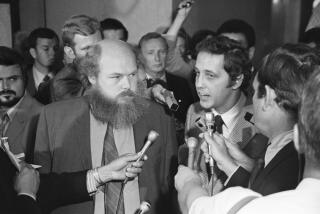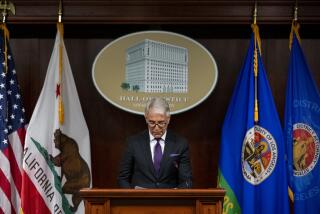The future of working -- and networking
- Share via
Last week, the New York Times reported that Rielle Hunter’s lawyer, who issued a statement in December that Hunter was not carrying John Edwards’ child, and Andrew Young’s lawyer, who shortly thereafter issued a statement that Hunter was carrying hishis client’s child, were not unconnected to each other. Instead, both had worked on legal cases with Fred Baron, the influential trial lawyer and former finance chairman of Edwards’ presidential campaign. The link between two supposedly independent players via a key Edwards advisor suggests that attempts to control the scandal have been much more extensive than first reported.
We would have known all this from the start if the three lawyers, like so many millions of other people, had set up profiles on a social networking site such as LinkedIn or Facebook and connected to each other. But, of course, high-profile lawyers don’t tend to spend much time on such sites, and when they do, they’re not likely to announce connections they’d rather the rest of us not know about.
Which is too bad. Because as the latest wrinkle in the Edwards drama shows, networks are important, and it’s usually the unstated ones that matter the most. We may not like what this implies about how opportunity, resources and information are distributed in society, but it’s a reality that social scientists and advanced technologies are increasingly forcing us to face -- and make the best of.
Networks are the channels through which our social capital flows: who influences us and whom we influence, whose resources we can call on in advancing a cause or weathering a crisis. Those who master the power of networks reap other benefits: the ability to draw on new ideas when trying to solve a problem, the authority to broker a compromise between warring parties, a reputation for trustworthiness.
Social scientists are refining our understanding of the pervasive role networks play. They have found, for example, that corporate boards whose members are highly connected to the members of other boards award their chief executives higher compensation, suggesting a path through which rising salary norms get passed from group to group. Mutual fund portfolio managers seem to invest more heavily in -- and enjoy greater returns from -- companies with a top officer who attended the same college or graduate school as them.
Most of us have our own networks of friends, classmates and colleagues -- largely invisible to the outside world -- that we vigorously tap when looking for a new job or trying to get our children into selective schools. Even so, we never fail to be surprised, if not shocked, when other people’s invisible connections turn out to play an important role in explaining events. We rarely think to look at the world through a network lens except when we want something or when things don’t go as we expect.
Indeed, a remarkable number of our after-the-fact analytical activities, from investigative reporting to seething about being passed over for a promotion, are ultimately attempts to piece together other people’s networks, even if we don’t always recognize them as such. We would be better off if we assumed from the start that networks and connections play an ongoing role in shaping people’s priorities and behaviors, including our own.
For instance, the election of the new president will set off a frenzy of string-pulling, chit-calling and reconnecting of people who haven’t seen each other since law school, as those hoping for a spot in the new administration plumb their networks to see if they overlap in any way with the new president’s inner, and not-so-inner, circles. For some, the path will be straightforward; many others will find themselves relying on their cousin’s tennis partner to get their resume into the right hands.
As wave after wave of more than 3,000 appointments are made, we the people will see only the end results and little of the networks that led to those results -- until there is a catastrophic failure. Which is what happened with Michael Brown, the FEMA director during the Hurricane Katrina catastrophe. Brown had no discernible emergency-management experience but was brought into the agency by an old friend who was the president’s former campaign manager. When that happens, we denounce the power of connections, forgetting that networks are equally essential in putting talented people where they can do some good.
Eventually, a new generation of data-sifting technologies and social science insights will move from the lab to our laptops, and we will be able to easily uncover the connections of those around us and understand their implications. We won’t need investigative reporting to tell us that two seemingly independent lawyers share a key connection, because we’ll already know that they do. And it won’t surprise us either. We’ll also be able, in a systematic and rigorous way, to evaluate our leaders based on the quality of their networks.
This powerful transparency will dramatically change how scandals such as the Edwards affair unfold. It also will bring with it the need for a new national dialogue about how society’s opportunities and resources are distributed and fairness is determined. Networks play a vital role in putting the right people in the right places, but they also raise barriers to equally talented people who lack a way of getting the right person’s attention. Although we think of ourselves as rational and meritocratic, the role of social networks in our behavior and decision-making reminds us that we are still in many respects tribal beings, even in the halls of power.
Bradley W. Bloch is a New York-based entrepreneur leading the development of a new system that will map the social networks of people in the news.






